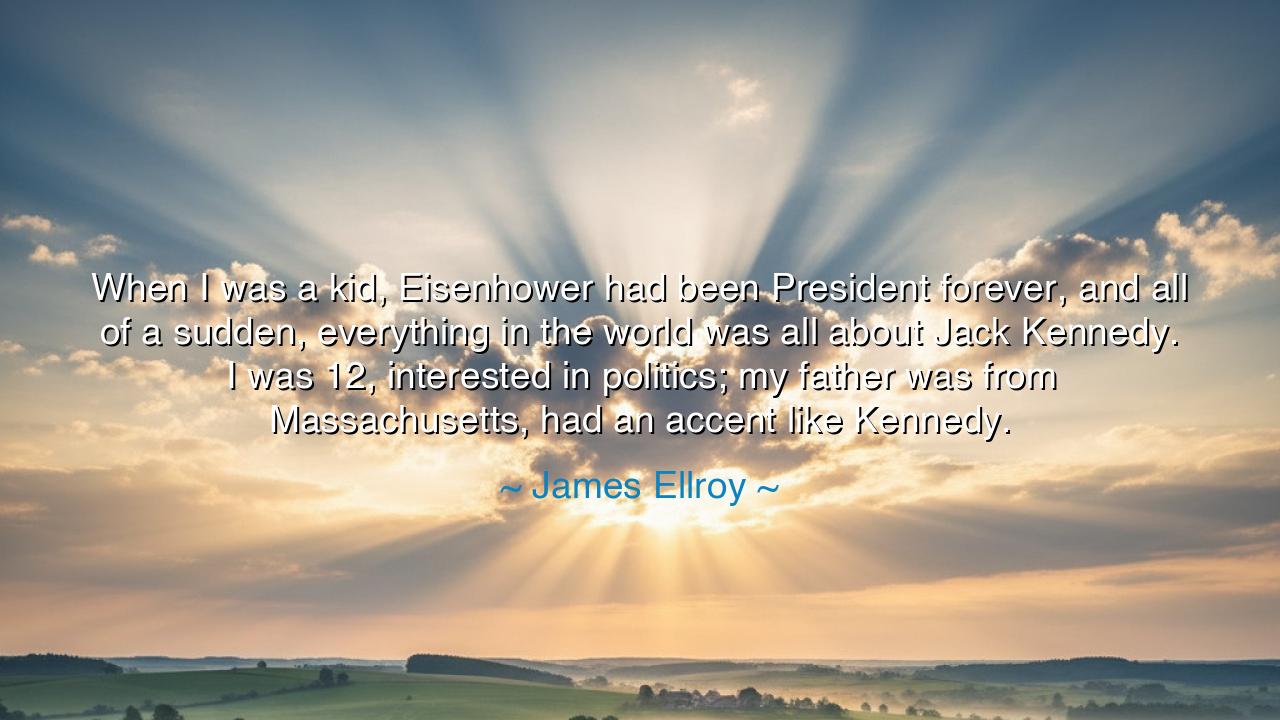
When I was a kid, Eisenhower had been President forever, and all
When I was a kid, Eisenhower had been President forever, and all of a sudden, everything in the world was all about Jack Kennedy. I was 12, interested in politics; my father was from Massachusetts, had an accent like Kennedy.






Change often arrives not quietly, but like a storm that sweeps across the world, altering the spirit of an age. When James Ellroy declared, “When I was a kid, Eisenhower had been President forever, and all of a sudden, everything in the world was all about Jack Kennedy. I was 12, interested in politics; my father was from Massachusetts, had an accent like Kennedy,” he was speaking not only of his childhood memories but of a turning point in history. His words capture the moment when a steady, familiar world gave way to a new era of energy, youth, and idealism, embodied in the figure of John F. Kennedy.
For years, under Dwight D. Eisenhower, America had known stability and continuity. Eisenhower, a war hero and calm leader, symbolized a world shaped by tradition and order. To a child, his presidency might have seemed eternal, like a mountain that never moves. But history is never still. When Kennedy emerged, with his charisma, eloquence, and bold vision, it was as though a new dawn broke suddenly over the horizon. To young Ellroy, and to millions of others, the world seemed to shift overnight, infused with fresh possibility and excitement.
Ellroy’s words also speak of personal connection. His father’s Massachusetts accent, echoing Kennedy’s own, forged a link between the great stage of politics and the intimate realm of family. This illustrates how historical figures do not exist only in books or speeches; they live in the voices, memories, and identities of those who witness their rise. For a 12-year-old boy fascinated by politics, this connection would have made Kennedy’s ascent feel deeply personal, a shared pride mingled with the awe of watching history unfold.
The transition from Eisenhower to Kennedy marked more than just a change in leadership; it was a cultural transformation. Kennedy’s youth and vision inspired movements in civil rights, space exploration, and public service. His famous call to “ask not what your country can do for you—ask what you can do for your country” ignited a generation. Yet this era was also shadowed by Cold War tensions and eventual tragedy. Ellroy’s memory captures the innocence of that moment, before the assassination that would shake the nation and forever alter its path.
History is filled with similar moments when the old world yields suddenly to the new. The rise of Franklin D. Roosevelt during the Great Depression, or the emergence of Nelson Mandela after years of apartheid, brought similar surges of collective hope. In each case, people felt history shift beneath their feet, and individuals, like Ellroy, carried those memories as lifelong markers of change. These transitions remind us that politics is not merely policy, but the emotional heartbeat of a people.
Let this wisdom endure: the leaders we see in childhood shape the landscapes of our dreams and fears. Ellroy’s reflection teaches us that political change is also personal change, felt deeply in the lives of individuals and families. From the calm reign of Eisenhower to the fiery promise of Kennedy, he witnessed the eternal cycle of history—how one era fades while another rises, and how the voices of leaders become part of our own stories, carried forward through memory and time.






AAdministratorAdministrator
Welcome, honored guests. Please leave a comment, we will respond soon